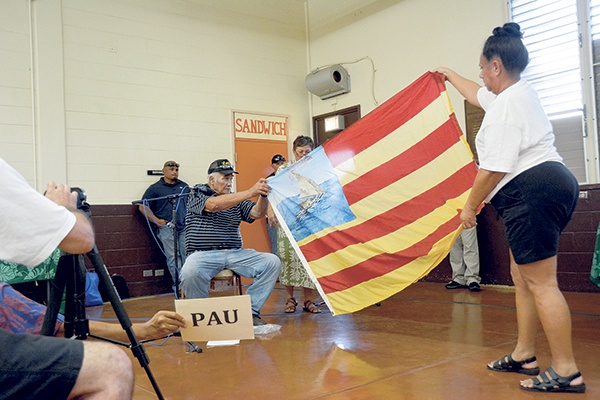WAIMEA — There are 566 federally recognized Native American tribes in the United States.
Unlike all of them, Native Hawaiians currently don’t have a government-to-government relationship with America.
“There’s a process that exists for every other native person in this entire county, but it does not exist for Native Hawaiians,” said Reah Suh, an assistant secretary at the U.S. Department of the Interior.
Secretary of the Interior Sally Jewel is considering changing that.
“The community can exercise that option, or not exercise that option,” Suh said. “We’re just simply asking you, ‘Should we create that option?’”
As part of a series of statewide meetings, the DOI is on Kauai to accept public feedback on five specific questions related to whether — and how — it should proceed with an administrative rulemaking process to re-establish a government-to-government relationship with Native Hawaiians.
Kalanikumai ʻO Na Aliʻi Hanohano, of Koloa, said it’s time the U.S. government recognizes Hawaii as a sovereign nation. Hawaiians, he said, are not a race.
“We are a nationality, constituents of a subjugated and occupied Hawaiian nation,” he said. “We are not a tribe. We are not indigenous Americans. We are Hawaiians.”
Hanapepe resident Wilma Holi put it simply.
“No,” she said, to all five questions being posed. Instead, she said, it’s time to correct Hawaii’s dark history and make things “pono” once again.
More than 100 people packed Waimea High School cafeteria Monday evening for the first of two meetings on Kauai to discuss the issue. Due to the large crowd, some were forced to listen from outside. The meeting had originally been scheduled at the neighborhood center, but was moved at the last minute to make room for the larger crowd.
Testimony was passionate, emotional and even angry, but respectful, with most voicing similar opposition to the idea.
Kekane Pa said he is against federal recognition for the Hawaiian people and for total dependence. Over the years, there has been nothing but “lies, deception, theft and fraud” by the U.S. government, he said, drawing cheers from the audience.
Randy Wichman said the U.S. has not acted in good faith, and that it’s time the self-determination process is decided by the Hawaiian people.
“Discuss it and talk to us about the Kingdom of Hawaii as a ‘citizenship.’ Not one time have I ever heard the word citizenship — the citizens of the Kingdom of Hawaii,” he said. “You need to learn that word. It’s not about Native Americans. It’s not about race. It’s about the obliteration of a citizenship.”
The DIO said in a release that the purpose of such a relationship would be to “more effectively implement special political and trust relationship that currently exists between the federal government and the Native Hawaiian community.”
Dawn Chang, the meeting’s facilitator, reminded the audience that any decisions would be made down the road. And while the meetings provide a “historic opportunity” for everyone to come to the table and for Native Hawaiians to voice their opinion on the matter, she said she realizes it is a topic full of anger and emotions.
“For some, optimism,” she said. “For others, just great pain.”
Suh called the meetings leading up to those on Kauai as “some of the most intense” she’s ever witnessed or participated in. However, as federal officials, she said it is their responsibility to give native populations options and ask what they can try to do to help.
“And if you don’t want help, that’s fine. If you don’t want us to have anything to do with your process, that’s fine,” she said. “That’s a completely legitimate comment to give back to us.”
Many said they don’t want or need it.
“Don’t worry about us, we’ll take care of ourselves,” one man testified.
Others supported federal recognition.
Anahola resident Robin Danner said setting rules is “long overdue” and that through the process, Native Hawaiian can expect sovereignties, such as county, state and federal governments respecting their laws.
“We want to make our own laws, for our own selves,” she told the panel. “Your work today does not decide whether we can. Your work decides if you, the federal government, will finally respect us as a sovereignty in our journey to recover from a very difficult past.”
Mauna Kea Trask said he does not like the current state of the law, which is why he supports federal recognition of the Hawaiian people and the establishment of such a process.
“I would never support a process that I thought would hurt the Hawaiian people,” he said.
The Department of the Interior will host a second meeting from 6 to 9 tonight at Kapaa Elementary School.
The department has listed five threshold questions it wants to answer through the forums:
• Should the Secretary propose an administrative rule that would facilitate the re-establishment of a government-to-government relationship with the Native Hawaiian community?
• Should the Secretary assist the Native Hawaiian community in reorganizing its government, with which the United States could reestablish a government-to-government relationship?
• If so, what process should be established for drafting and ratifying a reorganized Native Hawaiian government’s constitution or other governing document?
• Should the Secretary instead rely on the reorganization of a Native Hawaiian government through a process established by the Native Hawaiian community and facilitated by the state of Hawaii, to the extent such a process is consistent with federal law?
• If so, what conditions should the Secretary establish as prerequisites to federal acknowledgment of a government-to-government relationship with the reorganized Native Hawaiian government?




